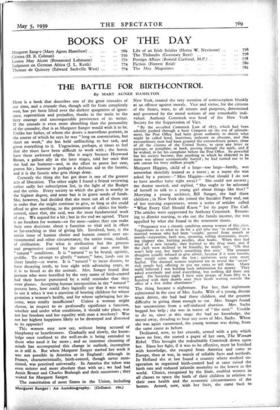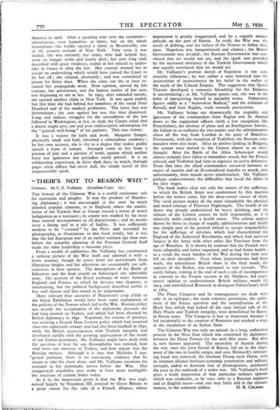BOOKS OF THE DAY
Margaret Sanger (Mary Agnes Hamilton) .. ... 769 Crimea (H. R. Colman) • • • • ... ... ... 770 Louisa May Alcoa (Rosamond Lehmann) ... 772 judgment on German Africa (J. L. Keith) ... 774 Thomas de Quincey (Edward Sackville West) ...
... 774
Life of an Irish Soldier (Henry W. Nevinson) ... 776 The Thibaults (Goronwy Rees) ... ... 776 Foreign Affairs (Ronald Cartland, M.P.)
•• •
778 Fiction (Forrest Reid) ... 780 The May Magazines
782
THE BATTLE FOR BIRTH-CONTROL
By MARY AGNES HAMILTON HERE is a book that describes one of the great crusades of our time, and a crusade that, though still far from completely
won, has yet been lifted over the darkest quagmires of ignor- ance, superstition and prejudice, thanks in the main to the fiery courage and unconquerable persistence of its writer.
If the crusade is even more absorbing than the personality of the crusader, that is as Margaret Sanger would wish it to be. Unlike her father, of whom she draws a marvellous portrait, in the course of which he says he was " long on conversation, but short on work," she has held unflinching to her task, and given everything to it. Ungracious, perhaps, at times to feel that she must have been difficult to work with ; the heroic have these awkward edges. She is angry because Heywood Broun, a gallant ally in the later stages, told her once that she had no humour—and, in the effort to prove her case, proves his ; humour is perhaps a dubious aid to the fanatic, and it is the fanatic who gets things done.
Certainly the thing she has got done is one of the greater acts of liberation. The other night I found a friend reviewing rather sadly her subscription list, in the light of the Budget and the crisis. Every society to which she gives is worthy in the highest degree, and none but is in grave needs of funds. She, however, had decided that she must cut all of them out in order that she might continue to give, so long as she could afford to give anything, to the promotion of clinics for birth- control, since that, she said, was the most fundamental work of any. We argued for a bit ; but in the end we agreed. There is no freedom for women—or for men—unless they can make their own decisions about a function so vital and in effect so far-reaching as that of giving life. Involved, here, is the entire issue of human choice and human control over en- vironmental and other circumstance; the entire issue, indeed, of civilisation. For what is civilisation but the process and progressive control by the mind of man over his " natural " conditions. It is " natural " to be brutal, egoistic, prolific. To attempt to glorify " nature," here, lands one in sheer fatuity—or worse. It is " natural " to incur disease, to have decaying teeth, to lose sight with advancing years, as it is to breed as do the animals. Mrs. Sanger found that persons who were horrified by the very name of birth-control had their horror punctured by a mild reminder that they wore glasses. Accepting human interposition in the " natural " process here, how could they logically say that it was wrong to use it when it was a question of bearing children for whose gestation a woman's health, and for whose upbringing her in-
come, were totally insufficient? Unless a woman might choose, in respect to so profoundly significant a function, whether and under what conditions, it should take place, was not her freedom and her equality with man a mockery? Was not her highest happiness likely to be destroyed and distorted to its opposite?
This women may now say, without being accused of blasphemy or heartlessness. Gradually and slowly, the know- ledge once confined to the well-to-do is being extended to those who need it far more ; and an immense cleansing of minds has accompanied this change in outlook, incomplete as it still is. But when Margaret Sanger started her work it was not possible in America or in England: although in France, characteristically, birth-control, though never men- tioned, was practised universally. In America the taboo was even stricter and more absolute than with us ; we had had Annie Besant and Charles Bralaugh and their successors ; they waited for Margaret Sanger.
The constitution of most States in the Union, including Margaret Sanger : An Autobiography. (Gollancz. r6s.) New York, treated the very mention of contraception blankly as an offence against morals. Vice and virtue, for the citizens of the States, were, to all intents and purposes, determined and governed by the moral notions of one remarkable indi- vidual. Anthony Comstock was head of the New York Society for the Suppression of Vice.
" By the so-called Comstock Law of 1873, which had been adroitly pushed through a busy Congress on the eve of adjourn- ment, the Post Office had been given authority to decide what might be called lewd, lascivious, indecent or obscene, and this extraordinary man had been granted the extraordinary power, alone of all the citizens of the United States, to open any letter or package, or pamphlet, or book, passing through the mails, and if he wished, to lay his complaint before the Post Office. So powerful has his society become, that anything to which he objected in its name was almost automatically barred ; he had turned out to be sole censor for forty million people."
Margaret Higgins, child of a large—too large—family, was somewhat sketchily trained as a nurse ; as a nurse she was asked by a patient—" Miss Higgins—what should I do not to have another baby right away? " She could not answer ; the doctor snorted, and replied, " She ought to be ashamed of herself to talk to a young girl about things like that! " Marrying a young architect, Bill Sanger, she had three children ; in New York she joined the Socialist Party and, out of her nursing experiences, wrote a series of articles called
" What Every Girl Should Know " for its paper The Call. The articles were suppressed by Anthony Comstock. Return-
ing to district nursing, to eke out the family income, she was appalled by what she found in the tenement slums.
"Pregnancy was a chronic condition among women of this class. Suggestions as to what to do for a girl who was ' in trouble,' or a married woman who had been ' caught,' passed from mouth to mouth—turpentine, herb teas, steaming, rolling downstairs, insert- ing slippery elm, knitting needles, shoe hooks. When they had word of a new remedy, they hurried to the drug store, and if the clerk were inclined to be friendly, he might say: ' Oh that won't help you, but here's something that may.' The younger druggists usually refused to give advice, Lecause if it were known,' they would come under the law ; midwives were even more fearful. The doomed women implored me to reveal the ' secret' rich people had, offering to pay me extra to tell them. Many really believed I was holding back information for money. They asked everybody and tried everything, but nothing did them any good. On Saturday night I have seen groups of from fifty to a hundred with their shawls over their heads waiting outside the office of a five dollar abortionist."
The thing became a nightmare. For her, that nightmare culminated in the case of Mrs. Sachs. Wife of a young, decent
truck driver, she had had three children, and the greatest difficulty in giving them enough to eat. Mrs. Sanger found her unconscious from a self-induced abortion. Mrs. Sachs begged her help ; she was in terror of " the next." Unable to do so, since at this stage she had no knowledge, she stayed away, dreading to hear any news of Mrs. Sachs. When she was again summoned, the young woman was dying, from the same cause as before.
Dedicated, now, to her crusade, armed with a pity which knew no fear, she started a paper of her own, The Woman Rebel. This brought the redoubtable Comstock down upon
her. Since her fight, if it was to be effective, must be fortified with knowledge, she escaped from America and came to Europe, then at war, in search of reliable facts and methods. In Holland she at last found a country where medical co- operation in organised birth-control had at once raised the birth rate and reduced infantile mortality to the lowest in the world. Clinics, recognised by the State, enabled women in all classes to space the birth of their children in relation to their own health and the economic circumstances of the homes. Armed, now, with her facts, she came back to America in 1916. After a speaking tour over the continent— adventurous, even hazardous at times, but on the whole triumphant—she boldly opened a clinic in Brownsville, one of the poorest sections of New York. Very soon it was raided; she was arrested; her sister, who had helped her, went on hunger strike and nearly died ; her own long trial, described with great vividness, ended in her refusal to under- take in future to obey the law. Her counsel wanted her to accept an undertaking which would have caused the Court to let her off ; she refused, absolutely ; and was committed to prison for thirty days. When she came out she at once re- sumed her propaganda work. Now opinion, moved by her courage, her persistence, and the human justice of her case, was beginning to stir at last. In 1925, after extended travels, she opened another clinic in New York. It was again raided, but this time she had behind her members of the social Four Hundred and of the medical profession. The latter fact was determinant ; the case against her was this time dismissed. Long and tedious struggles for the amendment of the law followed in Washington; at last, in 1936, the Courts ruled that a doctor might give, use and post contraceptive information for the " general well-being " of his patients. This was victory.
It was a victory for faith and work. Margaret Sanger, physically small and frail, inherited a tuberculous tendency ; by her own account, she is shy to a degree that makes public speech a form of torture. Strength came to her from a passion of pity and a passion of truth, against which neither force nor ignorance nor prejudice could prevail. It is an exhilarating experience, in these dark days, to watch, through pages often diffuse but never dull, the steady travel of this unquenchable spark.















































 Previous page
Previous page